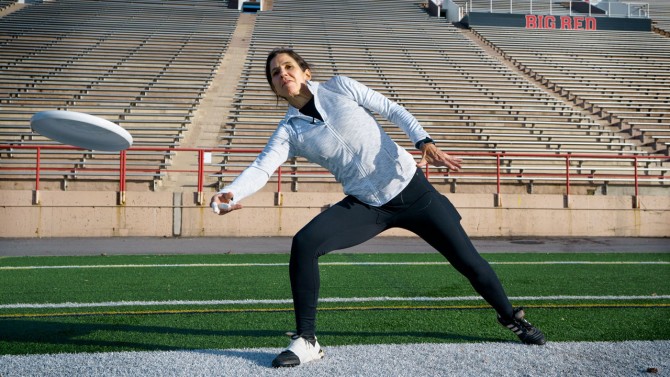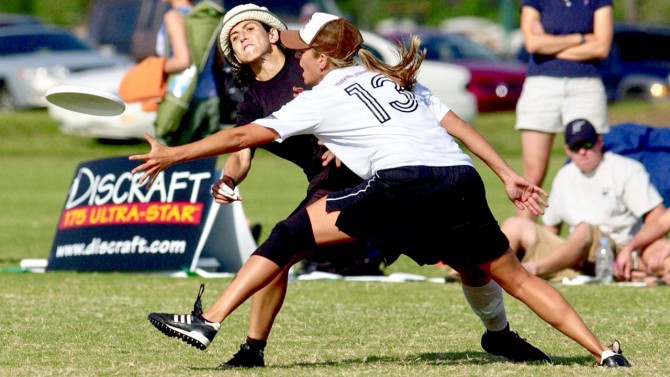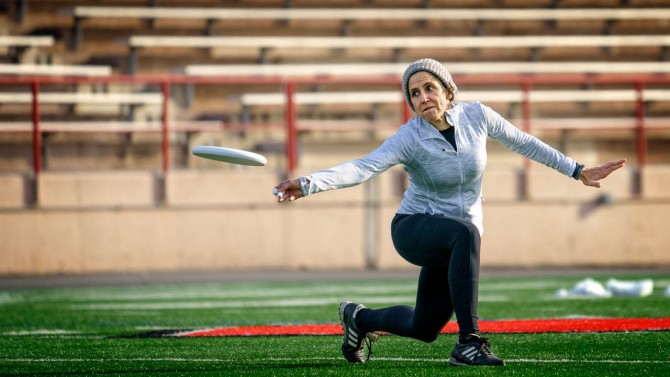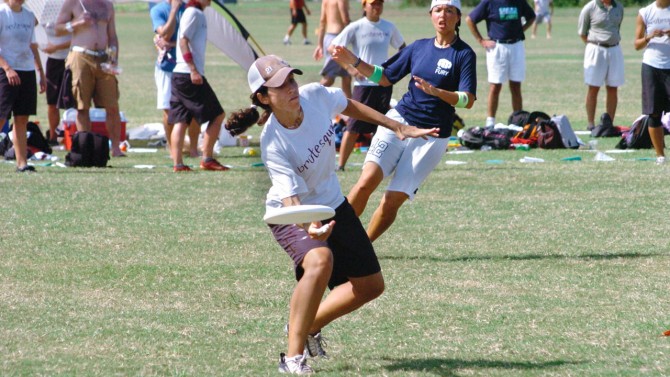Vivian Zayas ’94, associate professor of psychology, was inducted into the Ultimate Hall of Fame in October.
Professor chases plastic all the way to Ultimate Hall of Fame
By David Nutt
Some people are transformed by prayer. Others find their lives changed by politics or public service.
Nearly three decades ago, as a sophomore studying psychology at Cornell, Vivian Zayas ’94 was transformed by throwing a plastic disc.
She remembers going out on the fields near Helen Newman Hall with Cornell’s Ultimate Frisbee team. She enjoyed the camaraderie. The team was supportive. And the sport was addictive.
“I got hooked pretty early. It was liberating,” says Zayas, now an associate professor of psychology in the College of Arts and Sciences. “You’re on this field, you’re chasing the plastic. And during that whole time, not once do you think about the work that you have to do at Cornell.”
For more than two decades, Zayas chased the plastic – from Cornell’s campus to international championships on the semi-pro club circuit, all the way to the Ultimate Hall of Fame, which inducted Zayas in October. In total, she’s competed in 18 national championships and five world championships, winning two national and four world titles with her deep-field throws and tireless work ethic.
“To have my community validate me is really great,” Zayas says. “There’s something really special to see my peers – people who knew me, who played the game – say, ‘You contributed, you’re a Hall of Famer.’ It’s amazing.”
Ultimate Frisbee merges the nonstop movement of soccer and basketball with the throwing and catching mechanics of football. One of the first rules of Ultimate Frisbee, however, is don’t call it Ultimate Frisbee. Since Frisbee is a registered trademark, practitioners of the game refer to it simply as Ultimate.
Perhaps the most distinctive feature of the sport is the absence of referees. Players self-officiate and call their own fouls. When a dispute arises, it must be resolved amicably by the players. This results in what is commonly called “the spirt of the game,” where competition is encouraged but never at the expense of other players or the integrity of the game itself.
“I think that instills a sense of respecting your opponent, respecting the game and managing conflict,” Zayas says. “And it also changes the game, because the game isn’t about getting away with something.”
Cornell has one of the oldest Ultimate programs in the country, dating back to the founding of the men’s team, the Cornell Buds, in 1973. The women’s team, the Wild Roses, followed in 1980. Zayas now joins fellow Cornellians David Blau ’86, Tiina Booth ’76, Paul Brenner ’78, MBA ’79, Jim Herrick ’76, MBA ’77, Chris Van Holmes ’80, Daniel Weiss ’78, and Jon “JC” Cohn ’77 – who founded the Buds – in the Ultimate Hall of Fame.
There are two primary positions in Ultimate: handlers who throw the disc, and cutters who try to break free and catch it, and everyone on the field does both. As a handler, Zayas is known for her mastery of a wide range of throws – from flinging a disc straight down the line to another player with whip-fast speed and precision, to lofting a disc that can hover leisurely in midair, giving a downfield teammate enough time to catch up with it. Zayas has a particular knack for completing long-distance throws, called “hucks,” that for some players would be considered high-risk.
“As a first-generation Cuban-American, Vivian has been a leader and inspiration for countless players throughout her storied career,” the Hall of Fame organizers said in an announcement for this year’s inductees. “Known as one of the greatest throwers in the game, Vivian’s deep and break-mark throws made every downfield player a potential target, despite having the world’s best defenders assigned to cover her. … Vivian’s love and energy for the sport of Ultimate is what makes her a standout leader, player and inspirational teammate.”
When Zayas was growing up, she played piano and danced but didn’t participate in sports until high school, when she took up skiing and tennis. She had never played a field sport until she came to Cornell and discovered Ultimate.
She credits the game with helping her turn off the part of her brain that was always fixated on coursework and looming deadlines. Once she had a disc in hand, she could focus on what was immediately in front of her. The field. The empty space. The throw.
“It was an environment where you could really learn the game,” Zayas says. “The more you work, the better you get. And I continued to meet different people who made me want to get better and play at a higher level.”
The sport not only helped her transform herself physically, growing faster and stronger as an athlete. It also changed her as an individual.
“I’m definitely a different person now – physically, socially, emotionally, mentally – because of all the years of playing Ultimate,” she says. “As I matured as a player, I learned to better weather the lows and highs, and I became more even keeled. It’s not that mistakes didn’t bother me, but I didn’t get as worked up about them. I also learned the importance of giving your undivided attention, focus and energy to whatever you do. All I can do is be present, and as Ultimate players say, ‘leave it all on the field.’ The outcome is what it is, though I find that is usually positive when you give it 100%.”
‘You expanded your conception of yourself’
After she graduated from Cornell, Zayas had no job lined up or a career plan in mind. She just knew she needed to escape the Ithaca winter, so she looked to sunny California. She was also lured by the fact that some of the best Ultimate in the world was being played on the West Coast. She moved to the San Francisco Bay Area, where she worked “chasing ambulances” as a paralegal while hucking Frisbees on the club circuit.
“When I was playing the sport at Cornell, my parents were like, ‘What is this sport?’ And then I graduated, and they thought I stopped, but I kept playing,” Zayas says. “Almost every year, they’d ask, ‘So when are you going to stop playing this sport?’ And at some point, you know you’ve been playing for a long time when they stop asking.”
In 1997, Zayas moved to Seattle to pursue her Ph.D. at the University of Washington. Throughout her graduate and postdoctoral work, she continued to play competitively at the highest levels – first with Seattle’s Women on the Verge, and then with the Seattle Riot – ultimately winning three world championships.
Zayas’ search for a tenure-track teaching position brought her back to Cornell in 2007. Still wanting to play competitively, she joined Boston’s Brute Squad, in effect hucking herself more than 300 miles for practice and tournaments on the weekends. She also hired a trainer in Ithaca since she couldn’t practice with the team during the week.
“I was a professor at Cornell, and my teammates and my competitors were 18-year-olds,” Zayas says. “I had to definitely keep up with them.”
Tournaments can be particularly grueling. They typically last two to three days, and each team plays three or four games a day, hitting the field as early as 8 a.m. A single game can stretch up to two hours.
And there’s also international travel to consider. In 2007, Zayas was invited by the Ultimate Frisbee Association of Colombia to go to Bogota and Medellin to coach and play with the country’s national team, Revolution. She also trained youth players in elementary school and high school.
While the idea of teaching full time and commuting long distances to practice and competitions may seem exhausting, Zayas found that it created balance in her life.
“When you say ‘I don’t have time to go for a run, I don’t have time to train, I don’t have time to go and play,’ the reality is you do have time. You just don’t carve out that space. I think that could be a little unhealthy,” Zayas says. “In academia, it’s not a sprint, it’s a marathon. You have to be able to sustain a certain pace. I think having this other activity grounded me.
“Playing also promotes really good mental habits,” she says. “If I’m working on something and kind of ruminating on it, I can go out on the field. When I come back, I see that problem in a different way.”
Of course, as in any athlete’s life, there comes a day when the biggest challenge isn’t facing off against a cunning opponent. It’s getting out of bed.
After playing with the Brute Squad for four years, Zayas visited Boston in 2011 to look into a new Ultimate organization that was starting up.
“I had to get up in the morning. It was cold. And I was like, ‘Boy, I really kind of just want to stay in bed. It’d be nice to sleep in a little bit, just have coffee and relax,’” she says. “I’d played Ultimate for two decades. I milked it as much as I could. There’s joy in it. But I was done. I wanted to do other things and spend time with family and travel a little bit more.”
But Zayas wasn’t quite done. In 2012, she joined the U.S. master’s team for the world championships in Japan, which they won.
Zayas still plays the occasional tournament, and she’s participated in a summer league and some workshops and clinics in Ithaca, where her arrival is often greeted by “oohs” and “ahs.” Before going on sabbatical in fall 2020, she served as faculty adviser for the Wild Roses, helping a new generation of Cornellians learn to dial down their brains, get out on the field and chase the plastic.
When Zayas looks back at her Ultimate career, she experiences her own private highlight reel. There are the triumphant victories, team shenanigans and lifelong friendships. But mostly she remembers sensations.
“It’s associated with a feeling,” Zayas says. “There’s a state of awe, an expansiveness. Because in that moment, you expanded your conception of yourself.”
Media Contact
Get Cornell news delivered right to your inbox.
Subscribe




